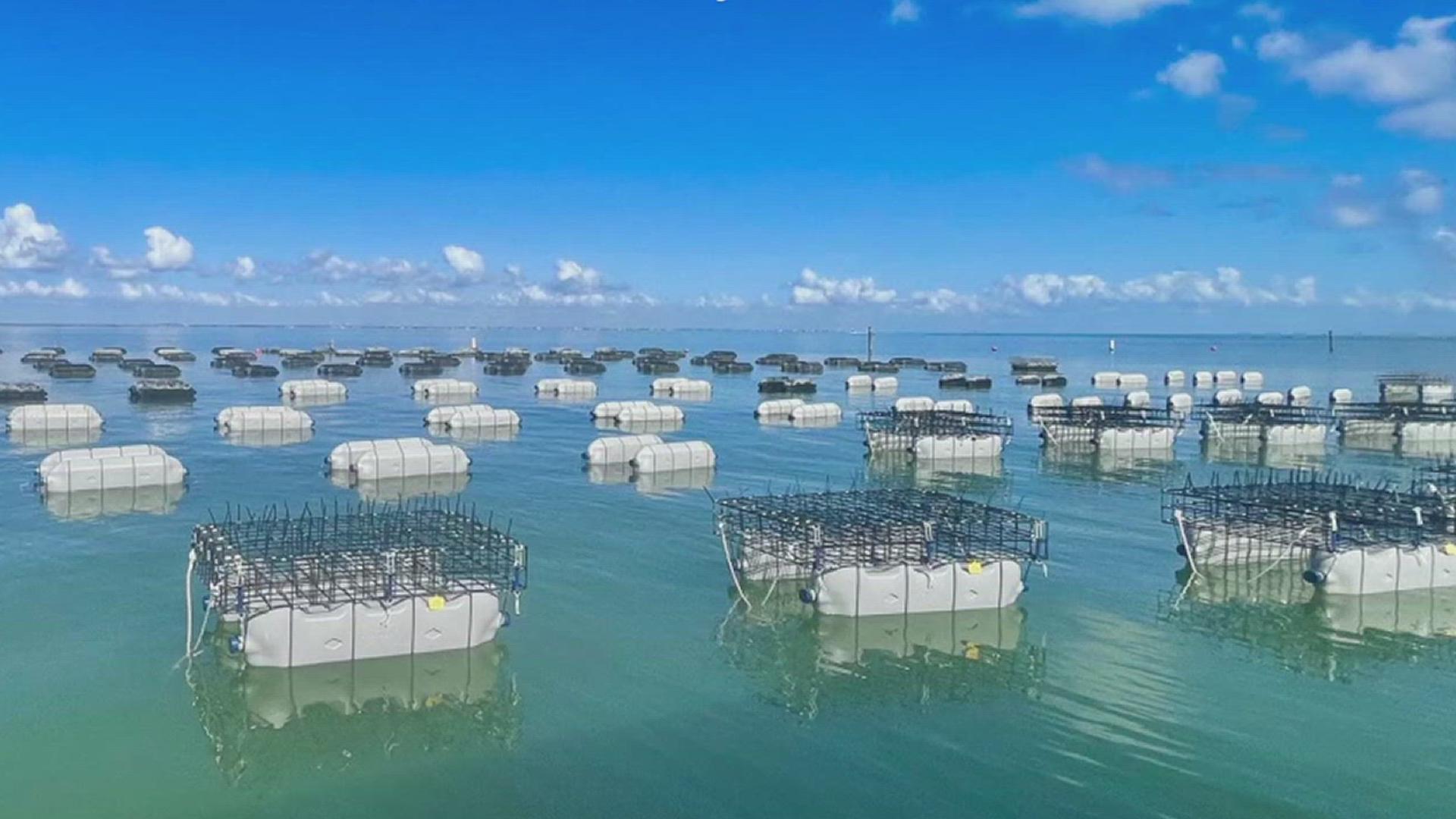CORPUS CHRISTI, Texas — Four years ago, an oyster farm didn't exist in Texas until a local man made it his mission to find a way to produce delicious oysters while conserving the ecosystem.
From cleaning our water, to providing a home for other animals, to preventing erosion on the ocean floor, oysters are an essential part of the Texas coast ecosystem.
Brad Lomax understood the importance of oysters in the Coastal Bend and that's why he created the Texas Oyster Ranch located in Copano Bay. His oyster farm became the first licensed in Texas and it paved the way for oyster conservation across the Texas coast.
"Dredging oysters is a disruptive form of commercial fishing, cause your dredging up the animal but also the habitat," Lomax said.
Lomax said it was a team effort from several people including Texas State Representative Todd Hunter, the HARTE Research Institute, and other local businesses to make it possible for this alternative oyster harvesting method to be practiced in Texas.
According to HARTE, Texas was the last remaining coastal state not allowed to oyster aquaculture. That's until 2019 when the Texas Legislature passed a law to allow a new method for raising oysters to be used instead of dredging the oysters from natural oyster reefs. Now, there are 11 licensed oyster farms across the Texas Coast, making a positive impact one oyster at a time.
"There's 10 more in the permitting process. So, probably by the end of 2025, 2026, we're going to have 20-something oyster farms," Lomax said.
Bill and Amelia Strieber are the owners of Clearwater Oyster Gardens of Texas which just harvested their first set of oysters in Aransas Bay. They said Lomax has guided them from the beginning and they're happy to be part of the conservation effort.
"These are started at a hatchery and they're put into floating cages and so the oysters actually grow at the top of the water column where there's a lot of sunlight and lots of good nutrients," Bill said. "We have a way of meeting market demand in a manner that doesn't harm the environment or the ecosystem and they're good oysters. They have a much better flavor profile than the naturally harvested ones."
Although, Texas is the second-largest commercial oyster harvester in the country, the oysters ecosystem is declining. That's why the Streibers are stepping up to be part of the solution.
"So, 85 to 90% of the natural oysters have been depleted historically. Whether that's through harvesting, hurricanes or otherwise, and it's getting worse," Bill said, "The Parks and Wildlife Department is restricting the harvest of natural oysters because there's becoming so few."
Amelia said oyster farming is hard work but it's also rewarding knowing they're making a positive impact on the environment.
"There's that saying, leave the world a bit better than how you found it," Amelia said. "This makes me feel like I can leave this little piece a bit better where we're not digging at oyster reefs and we're creating a cleaner water system."
Part of the oyster conservation effort is HARTE's Sink Your Shucks program that several restaurants participate in.
"Sink Your Shucks program gathers the used shells and puts them back into the water to create new oyster reefs. So, oyster farming not only doesn't destroy natural oyster reefs, it creates new reefs from our process," Bill said.
Recently, Lomax was appointed by Texas Governor Abbott to be part of the Commercial Oyster Mariculture Advisory Board which will advise state agencies on the oyster industry.
"The governor taking an interest in what we're doing and putting a group together to help us move it forward is very exciting and prestigious to be on there," Lomax said. "We got a long way to go in this industry. That group of people of scientists, entrepreneurs, and politicians are going to help us set policies that's going to enable this to grow."
Lomax said the restoration of our coastal environment is important and although oyster farming is making a difference, it could be years before the environmental impact is seen.
"We have to do something. It's a community effort, we're proud of it and we love where we live," Lomax said.

